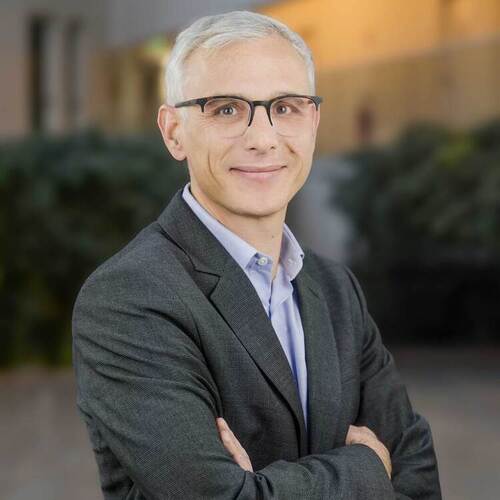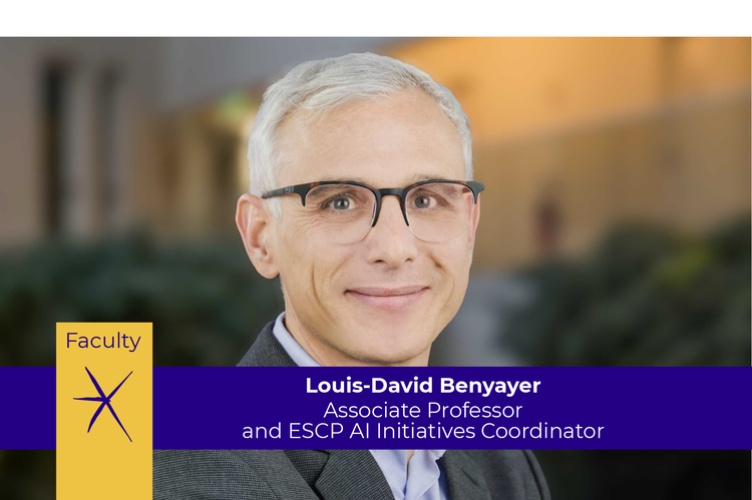ESCP announces new AI Initiatives Coordinator:
An interview with Professor Louis-David Benyayer.

In line with ESCP’s commitment to technological innovation and AI, Associate Professor Louis-David Benyayer has been nominated as the ESCP AI Initiatives Coordinator. This new role will help support students, faculty and staff to learn and thrive in an AI and technology-driven world.
Prof. Benyayer will also help lead a Proof of Concept (PoC) as part of the school’s partnership with OpenAI to explore innovative, data-driven methods to enrich the student experience and boost high-impact research.
We sat down with Prof. Benyayer to discuss a bit more about this new role, his views on AI and his vision for ESCP when it comes to AI. Read on to find out more.
What initially sparked your interest in AI, and how did you end up leading AI initiatives at our school?
My interest in AI started with data. 10 years ago, I wrote a book on the value creation opportunities with data, Datanomics. One of the arguments in the book is that data have no value per se, they accrue value when they are used and in particular when used to make automated decisions. The best example of this is the recommendation algorithms on e-commerce websites. Machine learning algorithms leverage massive data about the users to predict what product they would be interested in buying.
Since then I have been very much involved in the school on topics around data and AI: teaching classes about the value creation opportunities with Data and AI, co-directing our MSc in Big Data and Business Analytics, launching our Exec MSc in Big data in Dubai, producing research, and developing executives education certificates. So when the public version of ChatGPT was released in November 2022, I was already quite engaged in the conversation and started to use it in my classes as well as asking my students to use it in class and for assignments. It's been a great way to learn about the impact of this technology on education.
After my first experiments, I started sharing these experiences with colleagues, and as there was a lot of curiosity and interest, I volunteered to prepare an online course for the faculty on "Using Generative AI in Teaching" in January 2024. With all the conversations going on within the faculty and in business about the technology, the leadership of the school decided to structure and scale our initiatives. Among the first actions was the creation of this position which aims to coordinate all the efforts within the school and to partner with OpenAI to access the best-in-class technology.
What excites you the most about working in AI within an educational environment?
I would say I am excited both because AI is an opportunity for change and because the stakes are high. It's an opportunity for change because Generative AI is a new tool for our pedagogy. It stimulates creativity for teaching differently and it requires some adaptation, in particular for how we assess our students. The stakes are high because this technology can be detrimental to our students' learning if not used properly.
If our students use Generative AI as a substitute for their own efforts, they learn less and they fail to develop necessary skills. We have a responsibility as a business school to prepare our students for the workplace and equip them with the skills to succeed. When we award a degree, we certify they have acquired specific skills. So the stake for us is to ensure our students use Generative AI as a way to learn more or better, not as a substitute. The majority of them are aware of the issue. For example, they have already experienced that their Spanish speaking level doesn't improve when they use translation software for their essays.
What values or guiding principles shape your approach to AI and its implementation?
We want to develop an "if and how" approach, both for using AI in teaching and for AI as a topic of our classes. This means that we are conscious of the benefits and the challenges or issues. We want to consider AI as a tool, nothing more. When it comes to using it in teaching, our north star is the learning of our students. We want to develop tools and approaches that maximise their ability to learn. In some cases, AI appears as a learning booster and in others as a learning hindrance. Similarly, other pedagogical tools have shown remarkable performance: case study discussions, simulations, company projects, etc.
When it comes to addressing AI as a topic in our programmes, we want to train our students about the possibilities offered in the workplace but also about the risks and challenges: environmental footprint, biases, deepfakes, human labour, etc. Our objective is to train them to use AI ethically.
Can you tell us about the goals and vision for AI initiatives at our school?
Currently, our initiatives are organised around four priorities. First, we want to help our students to develop the right skills when they study. Some are technology-related, others are not (critical thinking, problem-solving, leadership, domain expertise). We want our students to use the technology as a tool for enhancement and not a substitute. To do so we are progressively providing resources to our students for using AI in their studies
Second, we want to prepare our students to decide if and how to use AI in the workplace. This requires training them on the possibilities and the limitations. To begin addressing this, a significant part of our students will receive a course on "Generative AI for business" this year.
Third, we need to adapt our pedagogy (how we teach and how we assess) to take into account the new usages of AI and leverage the possibilities offered. We need to decide if and how we use this technology for teaching. Lastly, we want to explore the possibilities of leveraging the technology in the research process. For the last two priorities we have increased the support for the professors to master the technology through a resource centre, coaching, and training.
Are there particular projects or applications you’re most excited about?
There are many of them, so it's hard to select. Our professors are really creative and some are true geeks so it didn't take long before we had some interesting experiments. For example, one of our professors had a debate during class between public figures (ministers, activists, corporate leaders) about the environmental impact of palm oil. For this debate, he used ChatGPT as a role player. Another group of professors on our Berlin campus developed a bot to support students in one of their classes: Academic Writing Skills. The bot answers general questions about the course content but also very precise ones related to deadlines and formal expectations at ESCP. These are just two small examples of many, with even more in the coming months as we are massively training, supporting and equipping our faculty and staff.
Can you tell us about any partnerships with other institutions or industry leaders?
We are participating in many conversations. For example, we will contribute a series of satellite events and written works to the AI Action Summit that the French government is organising in February 2025. With our Chairs and Professorships, we are addressing technology topics (Internet of Things) and their impact (Future of Work). We are also well connected to the GenAI environment through our partnership with OpenAI.
What advice would you give students interested in pursuing a career in AI?
The first thing is to become technologically literate. This means being curious and learning how these technologies work. For example, how does ChatGPT work? This is very important to be able to leverage the technology wisely in the workplace and develop an ethical usage.
To learn more about ESCP’s vision and initiatives for artificial intelligence, visit: ESCP AI
Campuses
